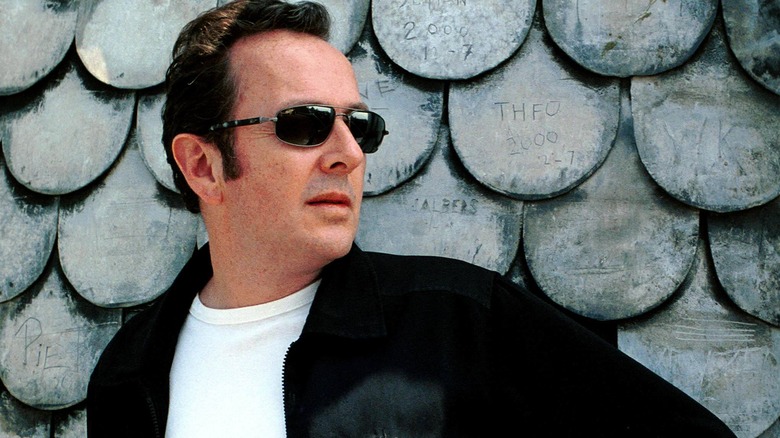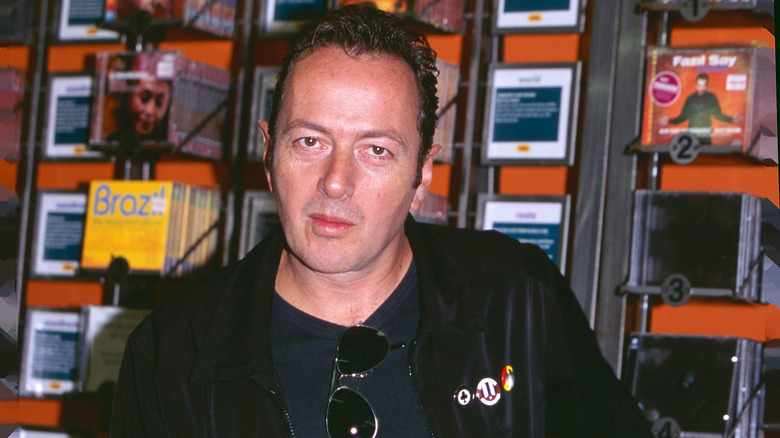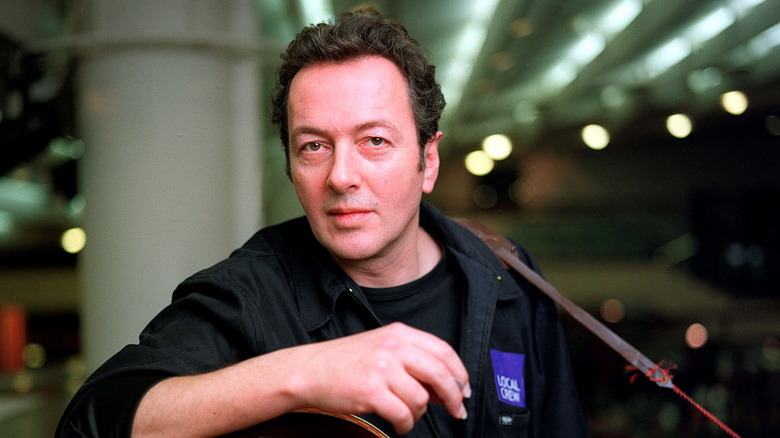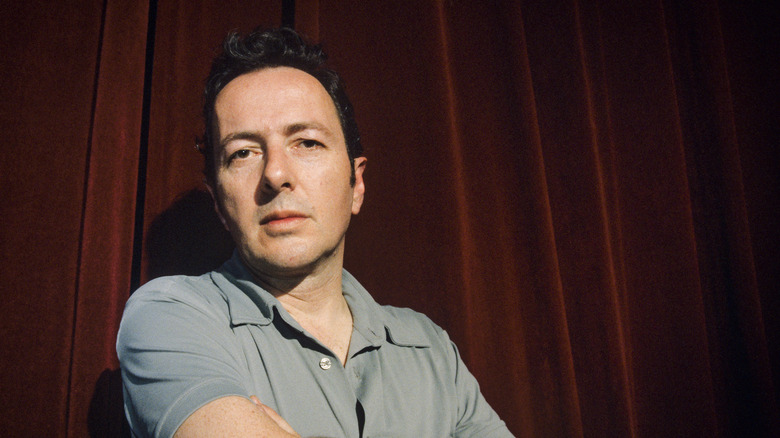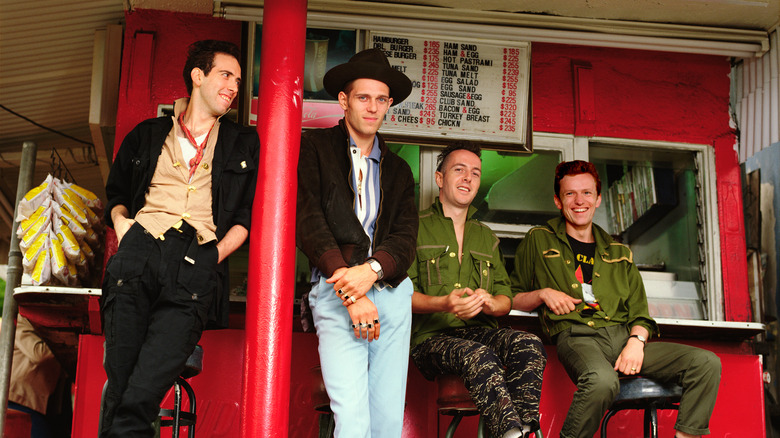The Tragic Real-Life Story Of Joe Strummer
The Clash was first and foremost a punk band. And that goes for the group's attitude, lyrical subject matter, and often gritty sound. As the band's longest-lasting lead singer, main songwriter, and guitarist, Joe Strummer wielded a lot of influence on the Clash's music, often angry, political tirades calling out corruption, inequality, and injustice in the band's native U.K. and around the world. Strummer carried on those themes in his solo work and his later band, the Mescaleros.
While songs by the Clash like "Know Your Rights," "London Calling," and "I'm So Bored with the U.S.A." dealt overtly with macro-political problems and global sadness, Strummer knew tragedy and heartbreak in his personal life. He very likely poured all of the pain endured by death and destruction into the music that made him so famous and beloved. Here's a look at the saddest and most unenviable moments in the life of Joe Strummer.
He survived an earthquake as a child
When he was a child, Joe Strummer's family never stayed in one place for too long. The future rock star's father, Ronald Mellor, served as a Second Secretary, a clerical officer for the British Foreign Office, or a diplomatic position. The Mellors lived in Turkey, Cyprus, Egypt, and Germany during Strummer's early childhood. The family's stint in eastern Mexico left a longstanding and traumatic impression on Strummer — the musician, four years old at the time, lived through a massive earthquake when he was not quite five years old.
"I remember the 1956 earthquake vividly," Strummer recalled, according to "Redemption Song: The Ballad of Joe Strummer." "Running to hide behind a brick wall, which was the worst thing to do." However, Strummer, very young at the time of the event, misremembered the date — a July 1957 quake that affected Guerrero and Mexico City registered 7.9 on the Richter scale and killed more than 50 people.
He was abandoned at a boarding school
Joe Strummer was born John Graham Mellor in 1952 to two Britons temporarily living in Ankara, Turkey. Strummer's father, Ron Mellor, worked as a diplomat for the U.K. government, and his duties took him around the world, often assigned to different, distant posts. When the Mellors worried that their two children (Strummer had a brother named David) were subject to a subpar education because it was constantly interrupted and restarted with frequent moves to new schools in different countries, they enrolled them in the City of London Freemen's School, a boarding institution. Free to jet off around the world, the Mellors dropped off nine-year-old Strummer at the beginning of the school year in September 1961. For years, he saw them rarely, at Christmas and in the summer.
The experience left Strummer with a significant psychological wound, having felt deserted by his parents. In particular, it created a lifelong rift with his mother still raw, active, and unforgiven more than two decades later. As Anna Mellor was dying of cancer in a hospice center in the mid-1980s, Strummer pointedly yelled at his mother over leaving him all alone at such a young age, albeit with his brother, whom he rarely saw at school.
His brother became a neo-Nazi
Joe Strummer didn't much publicly discuss his older-by-one-year brother, David Mellor. Strummer revealed the anger and sadness that characterized their relationship in "1988: The Year Punk Broke" by Caroline Coon, manager and graphic designer for the Clash. "I did but he's dead," Strummer said when asked to explain a reference to a brother; he had died by suicide in 1971.
An enthusiast of death imagery with a keen interest in the occult, Mellor harbored a profound case of social anxiety. "Imagine! You're in the world and you're just too shy to even talk to anybody," Strummer said. "He didn't like to talk to anybody and I think suicide was the only way out for him." Mellor's body was discovered in a bush in London's Regents Park three days after he died. Authorities called in teenage Strummer to positively identify his brother's remains.
In the years before his death and counter to his anxiety, Mellor got involved with the National Front, a U.K.-based fascist and antisemitic organization and political party. "He was a Nazi," Strummer stated unequivocally.
If you or someone you know is struggling or in crisis, help is available. Call or text 988 or chat 988lifeline.org
His father and mother died back to back
Joe Strummer's father, Ron Mellor, had a history of heart problems. Genetically predisposed to such ailments, Mellor had a serious heart attack in 1980, but survived and made a full recovery. At an early 1984 doctor's appointment, Mellor learned that he had a defect in his gallbladder. Physicians recommended an exploratory surgery to get a better handle on the problem and how to treat it. Mellor went down for his operation on February 29, 1984, and after receiving anesthesia, Mellor was hit with a second heart attack. This one was fatal, and he died in the hospital at age 67.
While recording the Clash's 1979 album "London Calling," Strummer told his bandmates that his mother, Anna Mellor, had been diagnosed with cancer. By early 1984, Mellor's condition had taken a turn for the worse, with the cancer spreading. Anna Mellor died in December 1986 at the age of 71.
His partner's brother took his own life
In late 1978, Joe Strummer met the woman who would become his partner of many years and the mother of his children: Gaby Salter, a friend of a woman dating Clash drummer Topper Headon. At the time, Salter was 17 years old; Strummer was 26. In 1984, Salter gave birth to the couple's first child, a daughter named Jazz. Two years later, while Strummer was away in Spain, vacationing with friends for a few months, Salter delivered another daughter — Lola Maybelline Mellor.
Ten days after Lola's birth on January 14, 1986, the family suffered a tragic death. Salter's brother, Nicky Salter, was a diagnosed paranoid schizophrenia patient. "I had this foreboding. I knew something was going to happen," Gaby Salter said in "Redemption Song: The Ballad of Joe Strummer." On January 24, 1986, Nicky Salter took his own life. "It tore the family apart," his sister said.
Joe Strummer died young
On December 22, 2002, Joe Strummer went out with his dogs for a walk in the area around his home in Somerset, England. Upon returning home, he collapsed. Strummer's wife, Lucinda Tait, found her husband unresponsive, and attempts to resuscitate him failed. Strummer died on the floor of his home. "It was such a shock. It wasn't like he'd been ill," Strummer's daughter, Lola Mellor, told The Guardian.
Authorities initially attributed the death of the rock star at the age of 50 to a heart attack. Somerset area coroner Michael Rose performed an autopsy within 48 hours, and his report would substantiate the theory, with Strummer's official cause of death listed as an unexpected cardiac arrest.
As a result of her father's sudden death, Lola Mellor would fall into a depressive state. Strummer's other daughter, Jazz, experienced a prolonged period characterized by panic attacks. Ten years after the musician's death, the Mellors staged a music festival in their father's honor, Strummer of Love.
He died right before a Clash reunion could happen
In early 2003, the Clash was inducted into the Rock and Roll Hall of Fame. Joe Strummer died in December 2002, just a few weeks before the ceremony. As many long disbanded and estranged bands had reunited on stage at their Rock and Roll Hall of Fame induction ceremony to reconnect and play a few songs, Strummer had such a coming together in mind for the Clash. Just after the Clash's upcoming entry was announced, Strummer played with former bandmate Mick Jones during a benefit concert, the first time they'd take the stage together in nearly 20 years. That was a warm-up for a possible Clash reunion that would never happen. "Joe definitely wanted the Clash to play at the Rock and Roll Hall of Fame. But I think he said it was all dependent on everybody wanting to do it, as well," Strummer's wife, Lucinda Tait, told Consequence.
Clash bassist Paul Simonen nixed a Clash reunion during Strummer's lifetime. "Everybody seemed quite interested in the idea, but I wasn't," he told Uncut. "I'd rather me and Joe worked together again in another project." Lucrative reformation offers came in while Strummer was alive, but a reunion never coalesced. "I think if Dad hadn't died, it would have happened. It felt like it was in the air," Strummer's daughter, Jazz Mellor, told The Guardian.

